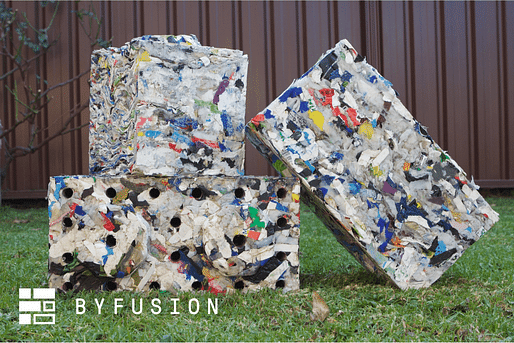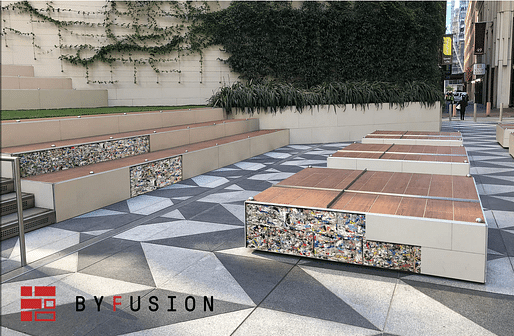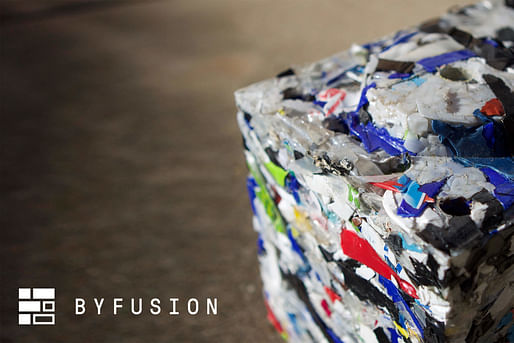
Sustainability startup ByFusion has developed what they describe as “the first construction-grade building material made entirely of recycled, and often un-recyclable, plastic waste.” Named ByBlock, the interlocking blocks use the same principles as LEGO with protrusions on the top surface allowing for blocks to be pieced together to form retaining walls, sheds, privacy fencing, accent walls, landscaping, and furniture.
To create ByBlock, the company collects discarded plastic, which is shredded and superheated before being fused into the completed block with no fillers or adhesives used. The blocks are sized to the same dimensions as standard concrete blocks (16x8x8 inches) but generate 41% less greenhouse gas emissions than concrete blocks during manufacturing, and hold the same thermal resistance value despite being 10 pounds lighter.

"Every ByBlock prevents 22 pounds from being landfilled or incinerated," ByFusion claims. "ByBlocks are designed to integrate harmoniously with traditional building materials such as lumber, steel, and cement to meet the structural requirement of the project; offering excellent dimensional stability, water-resistant properties, and handles high pressure load without cracking or crumbling.”
Performance credentials of the ByBlock include water and insect resistance, and compatibility with finishing materials such as stucco, drywall, plaster, siding, and paneling. In order to become fire resistant, the block would require the application of a thermal barrier as well as fire-retardant sprays, wraps, or panels.

The product forms part of ByFusion’s aim to address the global crisis of plastic pollution, which sees eight million tons of plastic dumped into oceans every year. The startup points to projections that by 2050, the volume of plastic in the ocean will outnumber the volume of fish, while today, less than 9% of plastic is recycled. The company has set an ambitious goal of recycling 100 million tons of plastic, or 25% of the USA’s annual plastic production, by 2030.
As Fast Company reports, the company has formed partnerships with cities including Boise, Idaho and Tuscon, Arizona as well as the Hawaiian town of Lihue, where the startup is constructing an elementary school pavilion with blocks made from locally collected marine debris and fishing nets.

ByBlock is one of a number of recycled materials which have recently made headlines in architectural discourse. Last month, we covered MVRDV’s use of recycled champagne bottles to create a façade for Bulgari’s flagship store in Shanghai, while in October, we covered the story of researchers at the University of Tokyo who have developed a new building material made from recycled concrete and carbon dioxide.
In July of last year, meanwhile, a team of researchers from Northeastern University published findings that recycled paper could cool buildings without electricity if placed on the roofs of existing houses, warehouses, and office buildings.
5 Comments
Super- more forever lasting microplastics for the environment as this becomes brittle over time. I hate this kind of product. Plastic doesn't belong in exterior applications.
I hadn't thought of this. Damn.
It's already in the environment, better in a wall than a landfill. That's the whole idea.
When plastic breaks down it's almost impossible to remove from the environment. If (IF) it was fully encapsulated it's one thing, but UV destroys plastic and the wind carries it to where it blows.
Admittedly I'm not an expert in plastics and environmental pollution. So is the best approach for plastics that have already been made (and that are in the environment) to bury them?
Fortunately, in this case, with the ByFusion bricks, the manufacturer specifies it needs to be fully enclosed by siding, stucco, vapor barriers, etc. That would contain it for 40+ years...but after that?
Block this user
Are you sure you want to block this user and hide all related comments throughout the site?
Archinect
This is your first comment on Archinect. Your comment will be visible once approved.